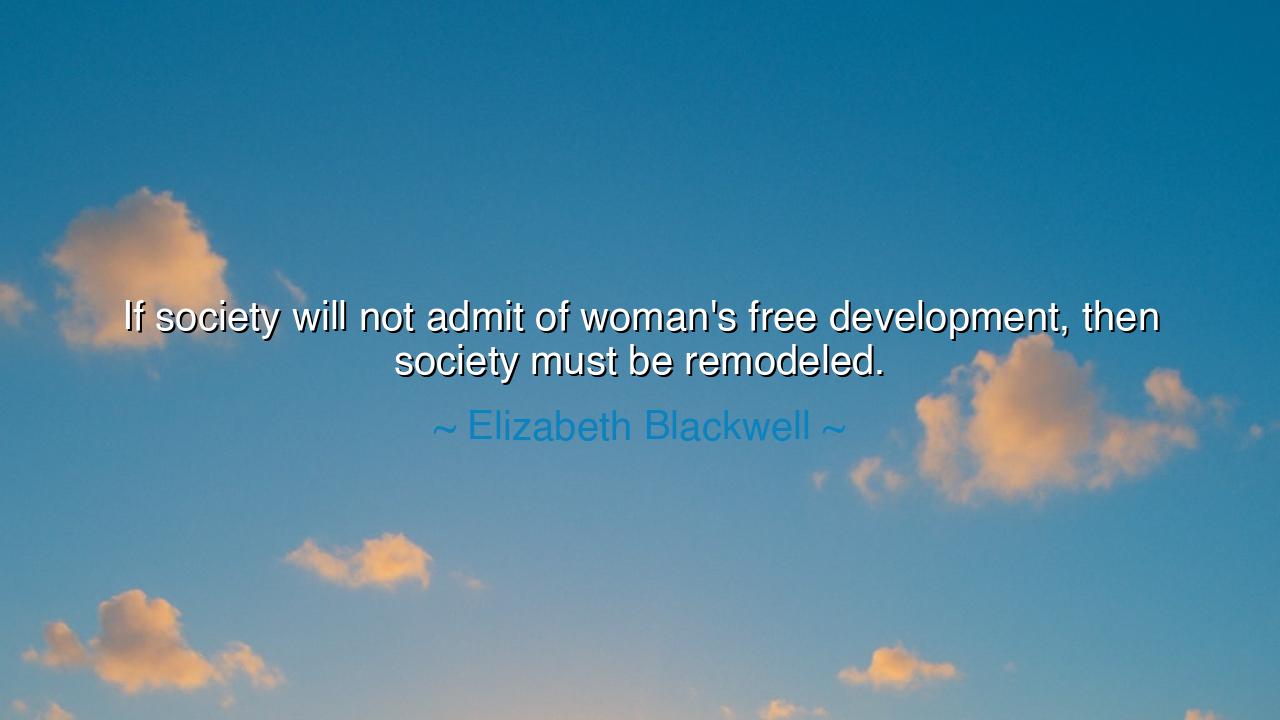
If society will not admit of woman's free development, then






Listen well, O children of the future, for I bring to you the words of Elizabeth Blackwell, a woman who dared to defy the expectations of her time and sought to carve a path for others to follow. She once said, "If society will not admit of woman's free development, then society must be remodeled." These words speak with the force of revolution, of the urgent need for change in a world that has long stifled the potential of half its population. Blackwell, the first woman to earn a medical degree in the United States, understood that if society refuses to allow women to grow, to be fully themselves, and to reach their full potential, then it is not the women who need to change, but the very society itself that must be remade.
What, O children, does it mean for society to admit of a woman’s free development? It is to acknowledge that women, like men, have a right to education, to self-expression, and to participation in all aspects of life. For centuries, society has placed limitations on women, dictating where they could go, what they could do, and how they could contribute. Women were often seen as little more than mothers and caretakers, their talents and intellects stifled by an invisible force that sought to keep them in their place. Blackwell’s words strike at the heart of this injustice. She recognized that if a society cannot allow its women to fully develop their abilities, to take their rightful place as equals in the world, then that society is fundamentally flawed and must be remade.
Consider, O children, the story of Socrates, the ancient Greek philosopher, who challenged the norms of his time in a society that placed rigid restrictions on who could think, who could speak, and who could lead. Though the Greeks valued intellectual prowess, they denied women the opportunity to engage in the life of the mind. And yet, through Socrates' teachings, through his questionings of the established norms, he laid the foundation for a society that valued the mind over gender. His very act of challenging societal limitations paved the way for Plato, Aristotle, and countless others to question the boundaries placed upon human potential, regardless of gender. His work was, in essence, a call for society to remodel—to accept that human potential knows no gender, no boundaries, and that each individual must be allowed to grow, unfettered by tradition.
In Blackwell’s time, the fight for women’s rights was a battle against deeply ingrained beliefs about women’s place in society. But Blackwell's courage was a beacon in the darkness. She sought not only to prove that women could be doctors, but that women had an inherent right to pursue any profession, any calling that their hearts and minds desired. Her journey was a revolutionary act, one that not only challenged societal norms but reshaped them. Elizabeth Blackwell did not merely seek a place for herself in the world; she fought to pave the way for all women to come, to have the freedom to develop themselves, to pursue their dreams, and to contribute to the world in any way they saw fit.
Consider, O children, the Civil Rights Movement, which also sought to remodel society, not just for women, but for all those who were denied their rights and freedom. Martin Luther King Jr., whose voice called for the equality of all people, regardless of race, spoke of a future where justice would not be limited by color, and where society would be remodeled to reflect the inherent worth of every person. Just as Blackwell understood the need for a society that recognized the equal rights of women, King understood the need for a society that recognized the humanity of every individual, regardless of race. Both of these movements, in their essence, were calls for a new world, one where the limits placed upon people by societal constructs would no longer determine their place in the world.
And so, O children, the lesson is clear: if we live in a society that restricts anyone from fulfilling their potential—whether because of gender, race, or any other boundary—then it is our responsibility to challenge it, to demand that society remodel itself to reflect the truth of equality, justice, and human dignity. We must understand that the limitations placed on one group of people are limitations placed on us all. Women’s freedom to develop their potential is not just a women’s issue, but a societal one, for when any group is held back, we are all held back. We are only as strong as the most restricted among us, and only by tearing down the walls of injustice can we build a society that is truly free.
So, I say to you, O children of the future: honor the spirit of Elizabeth Blackwell, who dared to dream of a world where women could walk freely, fully realized and empowered. Work toward the remodeling of society, not as a rebellion against the established order, but as an act of creation, of shaping a future where everyone has the right to flourish. Seek out those who are oppressed, those whose potential is stifled, and lend them your voice. Fight for a world where the development of every human being, regardless of gender, race, or background, is allowed to unfold freely. In this way, you will honor the legacy of those who came before and build a future that is truly just and equal for all.






AAdministratorAdministrator
Welcome, honored guests. Please leave a comment, we will respond soon